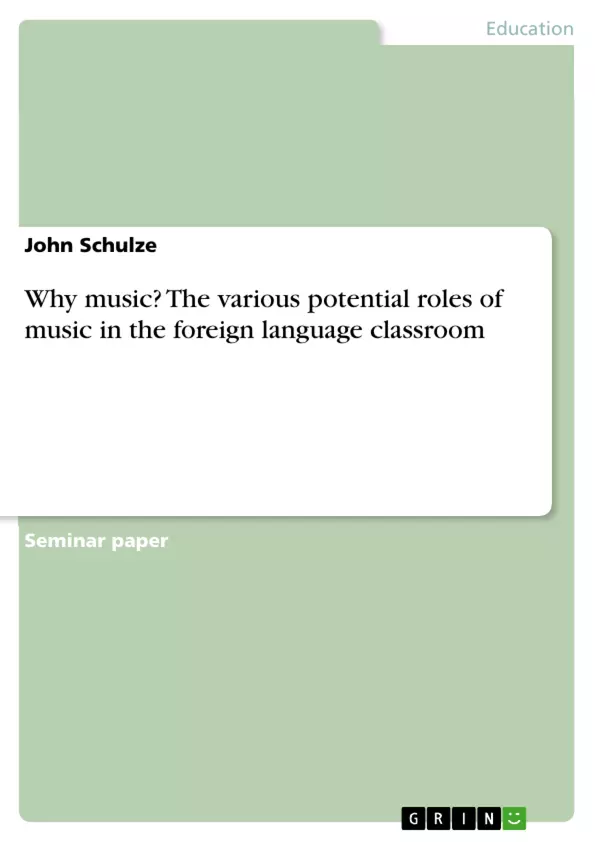Music can be an extremely versatile tool for the foreign-language teacher. It has the potential to support and improve learning on a variety of levels: it can activate, motivate, or relax students; it can help memorization of vocabulary or language structures; it can bridge cultural gaps or contribute to the emergence of a learning community; it can have neurological benefits; it can be used as authentic learning material or in the form of a ritual; and so forth. Theoretical and empirical work has been carried out to support these claims—of which many must feel obvious to foreign-language teachers, since music and song are essential parts of human culture and play a significant role part in the language-learning of infants—but these works are scattered across a range of disciplines from anthropology to linguistics or neuroscience and, to the best of the knowledge of the author, cannot be found in collected form in any publication.
Inhaltsverzeichnis (Table of Contents)
- Introduction: why music?
- Neurological benefits
- Music in the lives of students
- Emotions and the unifying effect of music..
- The benefits of music as authentic material...
- Perspectives, problems and concerns.....
Zielsetzung und Themenschwerpunkte (Objectives and Key Themes)
This paper aims to collect and demonstrate the various advantages and possible applications of music in foreign language learning. The paper highlights the versatility and potential of music as a learning resource, demonstrating its essential role in human culture. It explores the neurological benefits of music for language acquisition, particularly the positive effects on phonological skills. The paper also examines how music can engage students and contribute to their motivation for language learning.
- The role of music in education and language learning.
- Neurological benefits of music for language acquisition.
- The motivational aspects of using music in the classroom.
- The use of music as authentic learning material.
- The integration of music in various educational contexts.
Zusammenfassung der Kapitel (Chapter Summaries)
- Introduction: why music? This chapter introduces the rationale for incorporating music into language learning, highlighting its potential to enhance motivation, memorization, cultural understanding, and neurological development. It also explores the similarities between music and language, emphasizing the importance of both as forms of sound-based communication.
- Neurological benefits This chapter delves into the growing body of research on the neurological interplay between music and language. It presents findings on the shared brain structures involved in processing both domains and the potential benefits of musical training for language acquisition. This includes the positive effects of music on phonological skills, particularly for young learners.
- Music in the lives of students This chapter examines the motivational aspects of music for language learners. It discusses Thaler's concept of the "A-Dekalog" and its relevance to engaging students with music in the classroom, highlighting how music can connect with students' daily lives, provide authentic learning experiences, and contribute to a more enjoyable and engaging learning environment.
Schlüsselwörter (Keywords)
This paper focuses on the use of music in foreign language learning, exploring its neurological benefits, motivational aspects, and its role as authentic learning material. It examines the interplay between music and language in the brain, emphasizing the potential of musical training for language development, particularly for phonological skills. The paper also highlights the importance of connecting music to students' lives and utilizing it as a tool for creating engaging and motivating learning experiences.
Frequently Asked Questions
How can music benefit foreign language learning?
Music can motivate students, aid in memorizing vocabulary, bridge cultural gaps, and provide neurological benefits for language acquisition.
What are the neurological advantages of using music in the classroom?
Research shows that music and language share certain brain structures. Musical training can enhance phonological skills, which are crucial for language development.
Can music be used as authentic learning material?
Yes, songs provide real-world examples of language use, helping students engage with native-like speech and cultural nuances.
How does music affect student motivation?
Music connects with students' daily lives and emotions, creating a more enjoyable and less stressful learning environment that encourages participation.
Is music particularly effective for certain age groups?
While beneficial for all, music plays a significant role in the language learning of infants and is highly effective for developing phonological skills in young learners.
- Citation du texte
- M.A., M.A. John Schulze (Auteur), 2018, Why music? The various potential roles of music in the foreign language classroom, Munich, GRIN Verlag, https://www.grin.com/document/501020



